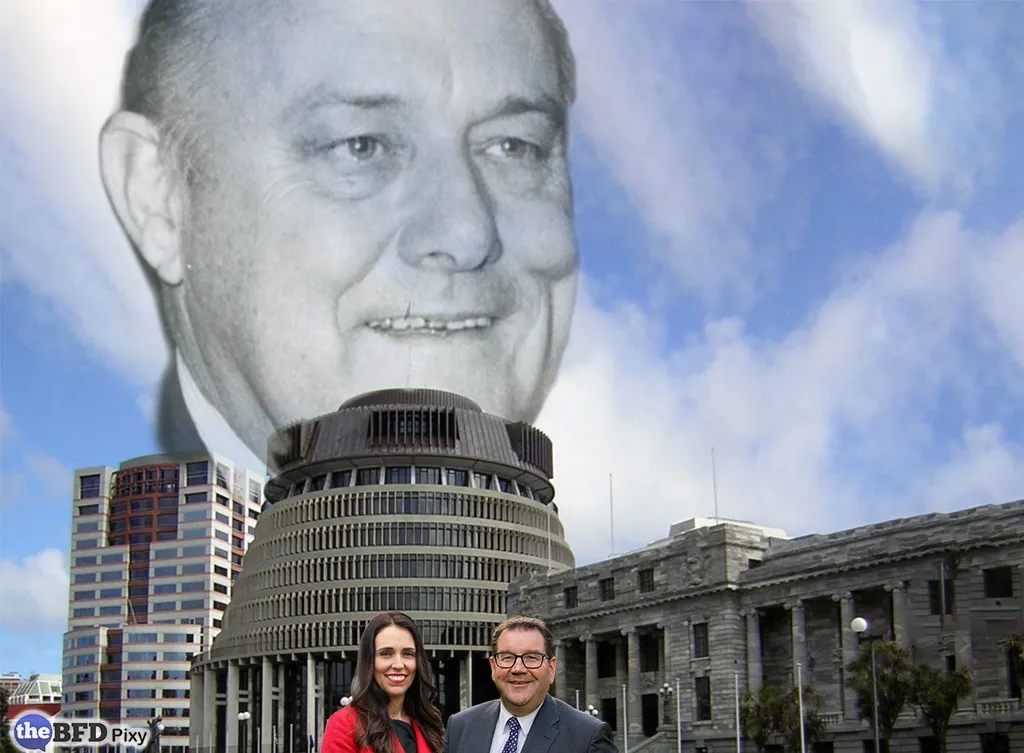Table of Contents
Don Brash
bassettbrashandhide.com
Shortly after the 1975 election, won by the National Party, Rob Muldoon announced that New Zealanders should stop contributing to the compulsory superannuation fund which the previous Labour Government had put in place. The law still stated that contributions were compulsory. The Prime Minister didn’t care: he was planning to change the law to scrap the Labour scheme.
But what Muldoon announced was against the law until Parliament was able to change the law, and when he was taken to court on the matter he lost.
I was reminded of that last week. The Electoral Act 2002 provides that any major change in voting arrangements – such as switching from First Past the Post to Single Transferable Vote, or creating racially-based wards – can be appealed by ratepayers, so that if 5% of ratepayers demand a referendum on the change, a referendum must be held.
Nanaia Mahuta announced last Monday that she doesn’t like the ability of ratepayers to demand a referendum, and intends to change the law. In the meantime, she simply told the local authorities where ratepayers were demanding a referendum to ignore the current law.
This is outrageous behaviour. In the last few months, nine local authorities have voted to create Maori wards, and in all nine districts ratepayers have begun collecting signatures demanding a referendum. In at least four of those nine – Tauranga, Whangarei, Kaipara and Northland – substantially more than 5% of ratepayers have already signed a petition demanding a referendum. The Minister has made it clear that she intends to ram a law change through Parliament under urgency, with virtually no time for the public to have a say on the change.
This is doubly outrageous in that it is quite clear from her public statements that the Minister has wanted to change the law to prevent this exercise of public opinion since well before the last election, but there was not a whisper of this change in Labour’s election manifesto. As Herald writer Audrey Young noted on the day after the announcement, this silence was “unforgivable”.
The Minister justifies her decision to change the law by noting that local governments can establish geographic wards without fear of being challenged. She also claims to want to “increase representation for Maori in local government”.
But of course changing a geographical boundary is fundamentally different from introducing race-based wards.
And it is entirely unclear what her justification for wanting to “increase representation for Maori in local government” is.
At the moment, every law relating to local government already requires local councils to consult with iwi. There is no mention of any other racial group which must be consulted. Only Maori.
The proportion of councillors who identify as Maori has been steadily increasing in recent years, and now almost exactly matches the proportion of Maori New Zealanders in the total population – 13.5% of all councillors were Maori in 2019, while according to the 2018 census Maori New Zealanders made up 13.7% of the total population.
We know from the large proportion of Maori in Parliament – significantly exceeding the proportion of Maori in the population – that Maori are absolutely as capable of winning election as any other New Zealanders.
What about our “obligations under the Treaty?” There is nothing in the Treaty of Waitangi – in any version of it – which implies that those with a Maori ancestor should have some preferential right to election to local councils.
And of course it is worth reflecting that roughly half those who identify as Maori are not on the Maori electoral roll, and so will be unable to vote for candidates standing in a Maori ward.
No, there is not the slightest logic for New Zealand’s having a racially-based electoral system. The Minister’s decision to ride roughshod over existing law and public opinion is a major black mark against the Government.
This article was first published at NZCPR
Please share this article so that others can discover The BFD.









